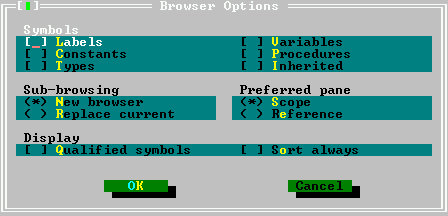
The symbol browser allows searching all occurrences of a symbol. A symbol can be a variable, type, procedure or constant that occurs in the program or unit sources.
To enable the symbol browser, the program or unit must be compiled with browser information. This can be done by setting the browser information options in the compiler options dialog.
The IDE allows to browse several types of symbols:
Allows quick jumping to a procedure definition or implementation.
Quickly browse for an object.
Browse a module.
Browse any global symbol.
Browse an arbitrary symbol.
In all cases, first a symbol to be browsed must be selected. After that, a browse window appears. In the browse window, all locations where the symbol was encountered are shown. Selecting a location and pressing the space bar will cause the editor to jump to that location; the line containing the symbol will be highlighted.
If the location is in a source file that is not yet displayed, a new window will be opened with the source file loaded.
After the desired location has been reached, the browser window can be closed with the usual commands.
The behavior of the browser can be customized with the browser options dialog, using the ”Options—Browser” menu. The browser options dialog looks like figure (6.9).
The following options can be set in the browser options dialog:
Here the types of symbols displayed in the browser can be selected:
Labels are shown.
Constants are shown.
Types are shown.
Variables are shown.
Procedures are shown.
Specifies what the browser should do when displaying the members of a complex symbol such as a record or class:
The members are shown in a new browser window.
The contents of the current window are replaced with the members of the selected complex symbol.
Specifies what pane is shown in the browser when it is initially opened:
Determines how the browser should display the symbols:
Sorts the symbols in the browser window.